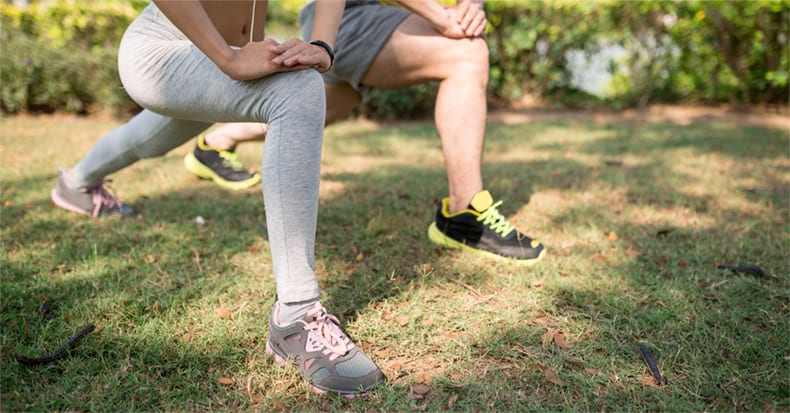There are two types of muscles that help facilitate motion in our hips and lower extremities: tonic and phasic.
Tonic (postural) muscles are always working or contracting to keep us upright. Therefore, these muscles tend to be tight and short. When we sleep, they contract or shorten and are taut upon waking and need to be stretched on a regular basis. Examples of tonic muscles include the hamstrings and the iliopsoas or hip flexors muscles. Here are two great stretches for these muscles:
Iliopsoas stretch: 1) Stand and take a step forward with the left leg into a front straddled position. 2) Rotate the left side of the pelvis forward so that it becomes square with the right side of the pelvis. 3) Perform a posterior pelvic tilt by flattening the curve in the low back while rocking the pelvis forward to create a strong stretch in the left groin/front of the hip. 4) Lean backwards to the right to further increase the left groin/hip stretch. Hold for five to ten seconds and repeat this on the opposite side. Practice these stretches multiple times a day.
Hamstrings stretch: 1) Lie on your back and place the left leg on a door jam with the right leg flat on the floor extending through the opening of the doorway. 2) Push the left leg into the door jam and hold for three to five seconds and then scoot closer to the door jam to stretch the hamstring. Hold for one to two minutes and repeat this on the opposite side, multiple times a day.
Phasic muscles, on the other hand, only work when needed and tend to be weak. These require strengthening, not stretching. Examples of phasic muscles include the abdominal and buttock muscles. Here are two great strengthening exercises for these muscles:
Abdominal strengthening: 1) Lying on the floor, place your hands behind your low back. Bend one knee/leg while keeping the other straight. 2) Lift your breast bone toward the ceiling one to two inches (2.54 to 5.08 cm) and hold for ten seconds. Repeat multiple times until the abdominal muscles are fatigued.
Buttocks strengthening: 1) Squeeze your buttocks together multiple times a day when sitting or standing. 2) Lie on your back with your knees bent and your feet flat on the floor. Raise your buttocks so it lines up with your trunk while pushing your heels into the floor. Hold for ten seconds and repeat five to ten times.
Depending on the nature of your hip pain, your doctor of chiropractic may recommend further exercises that you can perform at home as part of your treatment plan.



